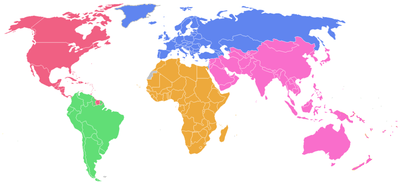Volleyball in the Philippines
 The Lady ALTAS Volleyball Team of the University of Perpetual Help, the back-to-back Champion during the National Collegiate Athletic Association (NCAA) Beach Volleyball Tournament 2013. | |
| First played | 1910 |
|---|---|
| Characteristics | |
| Type | Volleyball in the Philippines |
| Equipment | Volleyball |
The history of volleyball in the Philippines refers to the history of volleyball in the Philippines as a recreation and as a sport. Philippine volleyball history began in 1910 when the Philippines was a United States territory (1898–1946). The Filipinos have made significant contributions to volleyball in its evolution as a professional and international game. The Filipinos continued playing volleyball up to the modern-day period in its status as an independent republic (1946–present).
Introduction
It was introduced to the Filipinos by an American named Elwood S. Brown,[1] the then Physical Director of the Young Men's Christian Association (YMCA). It became a popular game held in backyards and at beaches in the islands. At first, the Filipinos invented their own rules for the game.[2] US soldiers who were assigned to the different islands of the Philippine during the period also helped in the widespread introduction of volleyball to the Filipinos. These American military servicemen encouraged the Filipinos to join them in playing during their time-off from military duties.[3] Early in the history of the game of volleyball in the Philippines, the Filipinos used trees as makeshift net holders (the net was hung between the two chosen trees).[2]
Filipino contributions
The Filipinos contributed two items to modern-day volleyball:[2]
Inspiration for the three-hit limit
The first contribution was that the Filipinos inspired American players to create the "three-hit limit" for each player in modern-day volleyball. This number of limits in hitting the ball was based by American volleyball players from the Filipino way of letting each player hit the ball before sending or "volleying" it over to the side of the opponent team. The Americans revised this method to become the "three-hit limit" because the old way of taking turns in hitting the ball took too much time, and had been observed to affect the intensity of the game and the motivation of the participating volleyballers (lessens the "challenge and the competitive nature" of the game).[2]
Setting and spiking the ball
The second Filipino contribution was the "set and spike" maneuver,[2] also known as "set and hit",[3] "setting and spiking",[4] or just "spike".[3] A spike is a form of volleyball "attack" done by the player by jumping, raising one arm above the head and hitting the ball so it will move quickly down to the ground on the opponent's court. The set, on the other hand, is an over-hand pass done by the setter (another player) using the wrists to push finger-tips at the ball.
It was after accepting the new set of rules created by the Americans regarding the "three-hit limit" when the Filipino volleyball players at the time invented the "set and spike" maneuver. The new technique invented by the Filipinos prompted American enthusiasts and participants in volleyball to call it as the "Filipino bomb", because "spiking the ball" was like a "hit" or a form of "attack" that can squash or "kill" the opportunity of the opponent team to hit the ball back for a possible point or win.[2] A more apt description of "hitting and spiking" is that it is "an offensive style of passing the ball in a high trajectory to be struck by another player."[4]
Associations
The Philippine Amateur Volleyball Association (PAVA) was founded by the Playground and Recreation Bureau (PRB) of the Philippines on July 4, 1961. It was renamed as the Philippine Volleyball Federation (PVF) in 2003.[2] The PVF was the recognized sporting body for volleyball until 2015, when recognition was transferred to the Larong Volleyball sa Pilipinas (LVPI), following a leadership dispute in the PVF.
LVPI is currently the sole national governing body of volleyball in the Philippines recognized as an affiliate and an accredited association by the Philippine Olympic Committee (POC), the Asian Volleyball Confederation (AVC) and the Fédération Internationale de Volleyball (International Federation of Volleyball, FIVB).[2]
See also
- Philippines women's national volleyball team
- Philippines men's national volleyball team
- Philippine Super Liga
References
- ↑ "Worldwide Growth, VOLLEYBALL HISTORY". Fédération Internationale de Volleyball (FIVB). Retrieved 7 December 2013.
- 1 2 3 4 5 6 7 8 Weinblatt, Victoria. "THE HISTORY OF VOLLEYBALL IN THE PHILIPPINES". LIVESTRONG.com (Oct 17, 2011). Retrieved 7 December 2013.
- 1 2 3 Oden, Beverly. "How Did Volleyball Come About?,Volleyball History 101, Volleyball". About.com. Retrieved 7 December 2013.
- 1 2 "This was How Volleyball was Introduced – Facts and Information About the Game / Timeline of Significant Volleyball Events". AthleticScholarships.net. Retrieved 7 December 2013.
External links
| Wikimedia Commons has media related to Volleyball. |
| Wikimedia Commons has media related to Set (volleyball). |
| Wikimedia Commons has media related to Attack (volleyball). |
- THE VOLLEYBALL HISTORY / Philippine Volleyball Federation
- Philippine Volleyball Federation profile at the Philippine Olympic Committee website

